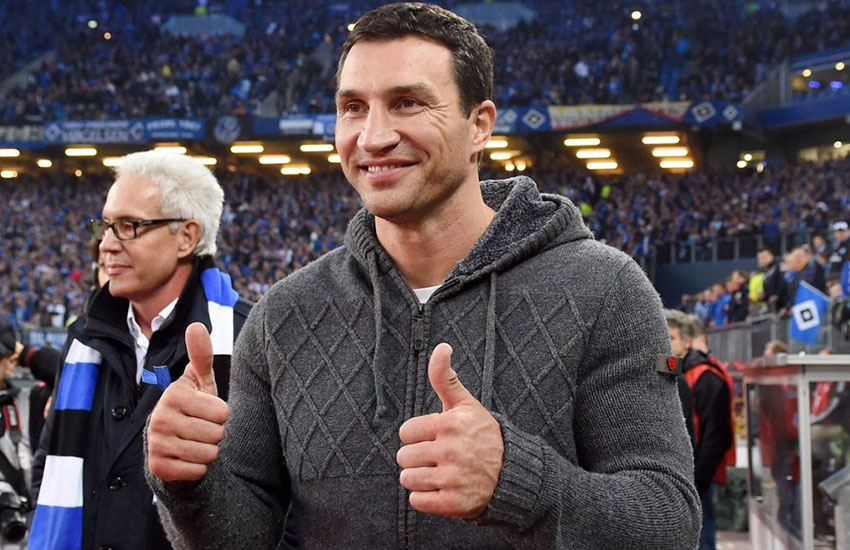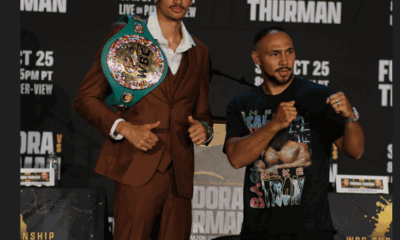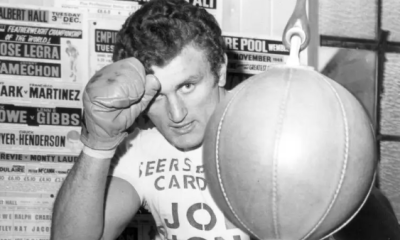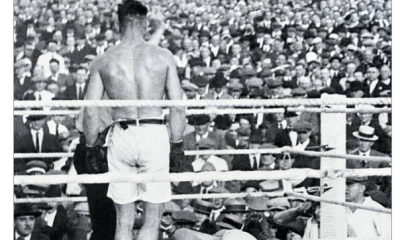Featured Articles
Wladimir Klitschko Embraced Al Davis’s Mantra: “Just Win, Baby”

Having maintained a home in Los Angeles for several years, there is at least a chance now-retired two-time heavyweight champion Wladimir Klitschko has some knowledge of Al Davis, the maverick former coach, general manager and principal owner of the NFL’s Raiders, in both their Oakland (twice) and L.A. residencies.
After the then-Los Angeles Raiders had hammered the Washington Redskins, 38-9, to win Super Bowl XVIII in Tampa, Fla., on Jan. 22, 1984, a smiling and self-satisfied Davis repeated to CBS interviewer Brent Musburger what already had become his and his team’s enduring catchphrase: “Just win, baby.”
If there is a difference between a just-win Klitschko – whose retirement announcement on Wednesday, depending upon one’s point of view, was either shocking or very much expected – and Davis, it is in the manner in which they went about the victory process. Davis was always a proponent of the quick strike, forever fond of quarterbacks who could launch the long ball and often did. His prototypical passer was Daryle “The Mad Bomber” Lamonica, who would send receivers Warren Wells, Fred Biletnikoff and Raymond Chester sprinting downfield on go routes until they were totally gassed or hauled in a couple of touchdown throws, whichever came first. Thirty-three years after Lamonica retired from the Raiders in 1974, Davis used the first pick in the NFL draft to select LSU rocket-launcher JaMarcus Russell, who had Lamonica’s big arm but was hardly a Tom Brady when it came to conditioning or the mental aspects of a complex game. Russell was out of the league after three hugely disappointing seasons, one of the most colossal busts in NFL history.
The 41-year-old Wladimir “Dr. Steelhammer” Klitschko – who received a Ph.D. in sports science from the University of Kiev and speaks four languages (Ukrainian, Russian, German and English) – always had been a dash of Lamonica and heavy doses of Frank Ryan, a fellow Ph.D. and former quarterback who is best known for leading the Cleveland Browns to their last NFL title (1964), far less for publishing two seminal papers in the Duke Mathematical Journal.
At 6-foot-6 and 245 or so pounds distributed on a chiseled physique reminiscent of Michelangelo’s David, the younger of the highly educated heavyweight champion Klitschko brothers – former WBC titlist Vitali “Dr. Ironfist” Klitschko, now 46, retired in 2013 and is the mayor of Kiev – could, and did, win using whichever method he deemed to be the most logical in a particular situation. He could air it out, if that best suited his purpose, as evidenced by the 54 knockouts he registered in fashioning a 64-5 record during a 21-year professional journey that five years hence will result in first-ballot induction into the International Boxing Hall of Fame. But Wlad, whose fragile chin was never his strong suit, was wise enough to understand that always going for broke in the ring sometimes can break even a heavyweight wielding a figurative steel hammer. He lost title bouts inside the distance to Corrie Sanders and Lamon Brewster, neither of whom will ever have a plaque in the IBHOF, and even had to overcome three knockdowns en route to a points nod over Samuel Peter in the first of their two meetings. And when Wlad also was dropped three times in his most recent bout, an 11th-round TKO loss to huge (6-6, 250), young (27) and strong Anthony Joshua on April 29, in which Joshua retained his IBF title and also annexed the vacant WBA belt before a crowd of 90,000 in London’s Wembley Stadium, a seed undoubtedly was planted in Klitschko’s analytical mind that apparently blossomed with Wednesday’s retirement announcement.
“… I’ve traveled the world, learned new languages, created businesses, built intellectual properties, helped people in need, became a scientist, entrepreneur, motivator, hotelier, trainer, investor and much else,” the statement read. “I was and am still capable of doing all this because of the global appeal of boxing. At some point in our lives we need to, or just want to, switch our careers and get ourselves ready for the next chapter and chart new courses toward fresh challenges.”
Reading the intelligently worded statement, I have no doubt it is factually correct and was actually composed by Wlad and not by a hired publicist, many of whom function as apologists for coarse practitioners of the pugilistic arts incapable of speaking complete sentences without a steady stream of vulgarities. Some fighters don’t seem to need or want such functionaries; witness the f-bomb-congested, four-city press tour to hype the upcoming Floyd Mayweather Jr.-Conor McGregor carnival sideshow. Raise your hand, perhaps sheepishly, if you are drawn to that bizarre matchup because of its gutter-level lead-up rather than in spite of it.
Klitschko, on the other hand, referred to the exciting slugfest pitting Olympic super heavyweight gold medalists (Wlad got his in 1996, Joshua in 2012) as a confrontation of “gentlemen,” staying classy despite the realization that he quite possibly was one big punch from career-rejuvenating success after he dropped the favored Briton in the sixth round, with over two minutes remaining to seal the deal. He didn’t, but considering his relatively advanced age and career-long 17 months of inactivity between his uninspired dethronement on points by Tyson Fury and showdown with Joshua, it could be argued that Wlad had been involved in his most exciting fight in years, and maybe ever. He immediately announced his intention to exercise the rematch clause in his contract, but with his retirement announcement negotiations for a do-over – in which the Kazakhstan-born, Ukrainian-raised son of a Soviet Air Force colonel stood to make upwards of $20 million on Nov. 11 at Las Vegas’ T-Mobile Center – ended.
Fight fans are left to debate whether Wlad could have or would have spanked Joshua prime-on-prime, but such exquisitely timed confrontations of elite boxers are relatively rare. Someone always is on the way up, someone always is on the way down. Having lost back-to-back scraps for the first time as a pro, and already affluent enough to consider the move into a rewarding next phase of his life, the erstwhile “Dr. Steelhammer” again chose the safe course. Who knows? Maybe he was influenced by last week’s report issued by the American Medical Association that, of 111 deceased NFL players who had donated their brains for scientific research, 110 had varying degrees of Chronic Traumatic Encephalopathy (CTE). In boxing, the gradual and silent thief of mental faculties is pugilistica dementia, which can debilitate the body even as it wipes clean memories of boxing glory, and pretty much everything else. No one can fault Klitschko if he is stepping away to ensure more quality time in the long term with his fiancée, American actress Hayden Panettiere, and the couple’s 2½-year-old daughter, Kara Evdokia Klitschko. If the child turns out to be anywhere near as smart as her pop, perhaps Wlad soon will be reading Dostoevsky bedtime passages to her instead of Mother Goose nursery rhymes.
Of course, book smarts and ring smarts are not mutually inclusive. Wlad always marched to the tune of his own drummer, even when doing so put him somewhat at odds with his late, great trainer, Emanuel Steward, who constantly preached the gospel of Al Davis-like aggression and often stood by, perplexed, as one of his most accomplished pupils formulated his own fight plans on the fly. Manny always wanted to see a little more of let ’er rip Thomas Hearns in Wlad, and sometimes got an XXL-sized version of master technician Willie Pep.
“For one-punch power, Wladimir tops them all,” Steward, who was Klitschko’s chief second for 17 bouts prior to his death, at 68, on Oct. 25, 2012, once said. “If he ever becomes more aggressive and just went after people, he could be the most devastating puncher ever. I’ve trained many fighters and Wladimir is one of the few who can turn out the lights without using the dimmer switch first.”
Had Klitschko attempted to tailor his style to fit Steward’s more action-packed specifications, there is at least a possibility he would have placed higher than No. 16 in a recent poll of 30 trainers, historians, matchmakers and media members conducted by The Ring magazine to determine the top 20 heavyweight champions of all time. He also might have been more often on the wrong end of knockouts, as was the case when he threw down with Sanders and Brewster. His stylistic choices make for a debate with no quantifiable resolution.
Before his April 25, 2015, title defense against Bryant Jennings in Madison Square Garden, with Steward disciple Johnathan Banks serving as his chief second, Klitschko – who would win by unanimous decision – explained that he never was one to adhere to strict dictums. Every fight is different and, well, it’s like Al Davis declared. The first rule of athletic competition, be it boxing, football or whatever, is to just win, baby.
“I cannot make the fight by myself,” Wlad explained. “I need somebody who wants to fight back. That’s what makes an exciting fight. If somebody just doesn’t want to get knocked out, it’s very difficult because you have to chase him.
“There have been different fights I’ve had in the 25 years (including amateurs) of my career. I do have different qualities of boxing and punching and, if it’s needed, of clinching. It doesn’t matter. I know the game and I know how to win to have lasted this long.”
Fighting primarily in Europe, most often Germany, during his extended heyday, Klitschko never felt the need to apologize for the 160-plus clinches in which he was engaged, many initiated by him, in a unanimous decision over Russia’s Alexander Povetkin on Nov. 5, 2013, in Moscow. He would have been lustily booed for that performance in the U.S., but he did what he felt he had to do to win. End of story.
And now the end of the story, at least the boxing part of it, really is here. Some will dismiss his lengthy time upon the heavyweight throne – 29 title bouts spanning two reigns, breaking the record of 28 held by the legendary Joe Louis – as being too boring, too casually dominant in most instances. But guess what? Floyd Mayweather Jr. has followed more or less the same path, with far fewer knockouts and significantly more expletives uttered. Art appreciation is a matter of individual taste, whether the canvases being examined offer comparisons between Tyson and Ali or Monet and Picasso.
Now that Wladimir Klitschko has signalled his intention to take his leave, probably for keeps, an appreciation is in order. He utilized his superior power selectively, but with telling effect, and he called upon his myriad other skills as warranted. Most of all, though, he remained a bastion of honor and dignity in a profession that sometimes is bereft of both qualities.
To comment on this article at The Fight Forum, CLICK HERE.
Check out more boxing news on video at The Boxing Channel.
-

 Book Review4 weeks ago
Book Review4 weeks agoMark Kriegel’s New Book About Mike Tyson is a Must-Read
-

 Featured Articles3 weeks ago
Featured Articles3 weeks agoThe Hauser Report: Debunking Two Myths and Other Notes
-

 Featured Articles3 weeks ago
Featured Articles3 weeks agoMoses Itauma Continues his Rapid Rise; Steamrolls Dillian Whyte in Riyadh
-

 Featured Articles3 weeks ago
Featured Articles3 weeks agoNikita Tszyu and Australia’s Short-Lived Boxing Renaissance
-

 Featured Articles4 weeks ago
Featured Articles4 weeks agoKotari and Urakawa – Two Fatalities on the Same Card in Japan: Boxing’s Darkest Day
-

 Featured Articles3 weeks ago
Featured Articles3 weeks agoIs Moses Itauma the Next Mike Tyson?
-

 Featured Articles2 weeks ago
Featured Articles2 weeks agoBoxing Odds and Ends: Paul vs ‘Tank,’ Big Trouble for Marselles Brown and More
-

 Featured Articles3 weeks ago
Featured Articles3 weeks agoAvila Perspective, Chap. 340: MVP in Orlando This Weekend




















